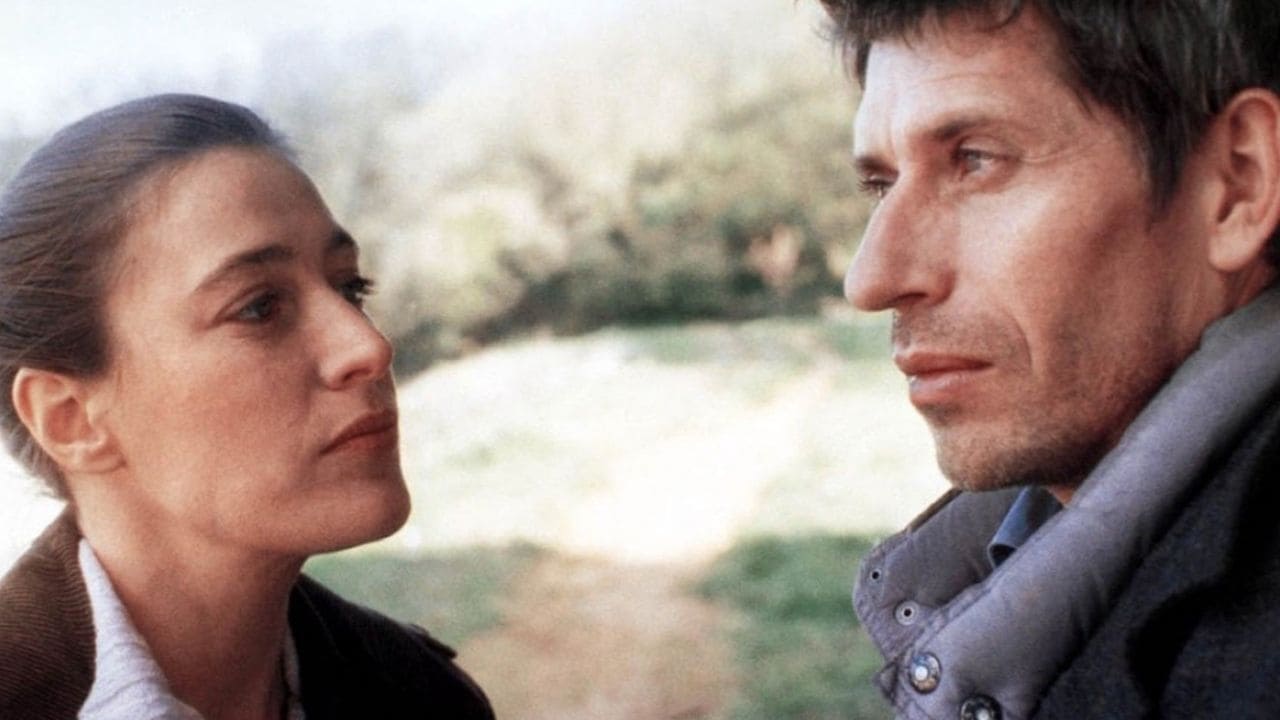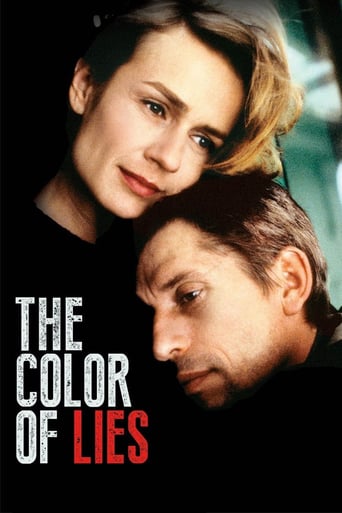

In the provincial St. Malo, in Brittany, the nurse Vivianne Sterne (Sandrine Bonnaire) and her crippled and sensitive husband René Sterne (Jacques Gamblin), who is a drawing teacher and former painter, live in an isolated shore side house. When his 10-year-old student Eloise is found raped and strangled in the woods nearby his house, the Parisian new chief of police Frédérique Lesage (Valeria Bruni Tedeschi) investigates the case and René becomes her prime suspect. Consequently his reputation and his life are destroyed and he loses his students. Meanwhile Vivianne is seduced by the arrogant and shallow writer and journalist Germain-Roland Desmot (Antoine de Caunes), who is a celebrity in Paris and is spending a vacation is his hometown, and is closer to him. Will Frédérique Lesage find the killer?"Au coeur du mensonge", a.k.a. "The Color of Lies", is another subtle and witty suspense directed by Claude Chabrol, one of the best French directors ever. The story shows flawed characters; therefore it is realistic and credible, and a study of human behavior in a small town. The performances are top notch and the conclusion is open to interpretation, a trademark of Chabrol. My vote is seven.Title (Brazil): "A Cor da Mentira" ("The Colour of the Lie")
... View MoreRene Sterne, a painter living in a Brittany coastal town, has resorted to taking private students that he guides in the art of drawing. A small girl is seen with Rene as the film begins. As she finishes for the day, the girl is sent home, but she never makes it. Her body will be found in a forest area not far from the Sterne's home, where she was left by a criminal who raped her. All eyes focus on Rene as the police comes to investigate.The painter is married to Vivianne, a physical therapist. They seem to be happy in their environment until Rene is questioned about his possible involvement with the crime. Vivianne wants him to cooperate because she believes in her husband, a man with a bad leg whose work is not selling. The new police inspector is Frederique Lesage, a Parisian woman. Being new to the area, she relies on her colleague Inspector Loudun, a practical man who knows the area better.Into this milieu walks a wealthy author, Germain Desmot, who lives in the vicinity. He has sent Vivianne a copy of his latest novel. It is clear Desmot likes Vivianne. He realizes she is somewhat dowdy with the things she wears. He goes as far to suggest she will look stunning in blue. Rene, is the background, seems to resent the familiarity between his wife and the sophisticated man. He has reasons to be because Vivianne has agreed to meet Desmot in a hotel. She lies to Rene, although the tryst turns out to be a failure.One night while Germain Desmot has been at the Sternes, he drinks too much, being unable to drive, Rene offered a boat ride to his house. When Desmot's body is found by a maid in a sort of courtyard, brings Inspectors Lesage and Loudun to the scene. Death was caused by a heart attack.Claude Chabrol directed this psychological study about a tormented man. The director co-wrote the screenplay with Odile Barski, his usual collaborator. The last part of Mr. Chabrol film legacy is not as interesting as his earlier period. In spite of that, this film shows Cabrol in a sobering mood. The girl's murder is only a distraction that resonates with Rene because he is made a suspect for doing it. Rene realizes Vivianne's infidelity, but he never says anything about what he knows happened between her and Desmot. At the end it is Vivianne who comes out stronger as her husband falls into depression for a crime he might, or might not have committed.Jacques Gamblin gives a good performance as Rene. Sandrine Bonaire had a bigger role in Chabrol's more satisfying film "La Ceremonie", she has a limited opportunity in this film to shine, but her Vivianne is a complex character. Antoine De Caunes is perfectly suave as Desmot. Valeria Bruni-Tedeschi's inspector is not one of the best things she has done in the cinema.Eduardo Serra, the man who was closely associated with Claude Chabrol was the cinematographer. Mr. Serra gets the right atmosphere of the small Brittany town in the off season. The musical score is credited to Mathieu Chabrol, the director's son. This film should be seen by all Chabrol's fans. While not one of his best, it shows the director at a different period of his long career.
... View MoreIn this and some other of Claude Chabrol's movies, it is as though he sets out to defy himself and his audience to feel any emotion. The pace is even; characters rarely raise their voices or lose their tempers; there is no on-screen violence; and the sex is minimal and decorous. The colour is carefully orchestrated, with cool blue predominating; and though the film is set by the sea, this is not the warm, seductive Mediterranean, but the cold, off-putting Atlantic; when the weather deteriorates, there are no violent storms, simply thick fog.Though superficially a drama about the rape and murder of a young girl, the real subject of the film is deceit and lying. From the trompe l'oeil paintings of the main suspect René Sterne (Jacques Gamblin), through marriage infidelity, to the smug hypocrisy of TV celebrity G-R Desmot (Antoine de Caunes), all is a sham. Nor does Chabrol shy away from reminding us that the film medium itself is based on illusion - a character reassures another "that's the sort of thing you only see in movies". But for all the movie's careful construction, and despite my trying hard to suspend disbelief, some elements of the film remained deeply unconvincing and even ludicrous. In particular, I found it impossible to accept Valeria Bruni Tedeschi as a police chief with an ultra-mild demeanour and a penchant for pink knitwear. Also, the film ended so abruptly that I for one missed any final point made by Chabrol. Nevertheless, there may be viewers more discerning than I who will find more value in this movie.
... View MoreThe hypothesis of Chabrol: that life in society is only possible if it is based on lies, in the film, is a total lie! Also, it's interesting that the narrator at the actual time of these problems: pedophilia, unemployment, female cops (on television), was neurotic. It seems contrived in many situations: the infidelity of Vivianne (the nude painting of her), the assassin (the photo that was found in the assassin's bag).
... View More